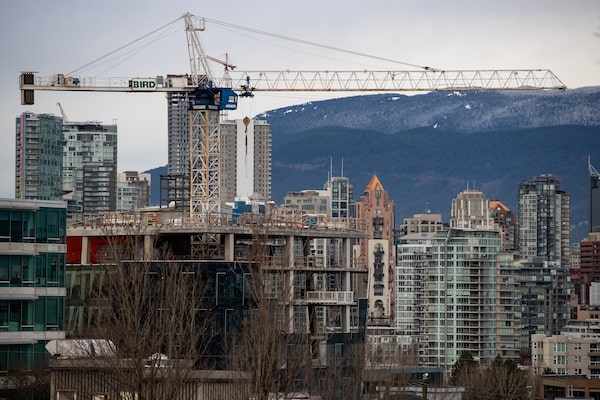
A construction crane sits idle at the site of an office tower under construction as downtown condos and the north shore mountains are seen in the distance, in Vancouver, on Saturday, Jan. 9, 2021.DARRYL DYCK/The Canadian Press
British economist Mariana Mazzucato wants to remake capitalism by shaping economic growth around objectives such as tackling social inequality and sustainability. Her ideas attracted the interest of British Columbia’s Jobs, Economic Recovery and Innovation Minister, Ravi Kahlon, who sought out the economics professor at University College London, and she spent a year helping draft a new economic plan for the province. In a telephone interview with The Globe and Mail’s Justine Hunter, Prof. Mazzucato explains the concepts behind the new “Stronger BC” economic blueprint, which is designed to build back from the pandemic and the climate catastrophes of 2021.
I can see how your economic theories on inclusive and clean growth would appeal to this NDP government, but we are talking about a small subnational economy. Can you reshape how capitalism works on that scale?
In some ways B.C. is the perfect size because it’s a region bigger than London, smaller than the country, but it has really specific issues.
What is really important is starting out with the big-picture issues and then landing it on the supergranular and then scaling it back up to the general. So, in Sweden, they begin with this very high-level mission of a fossil-free welfare state, but then they land it on things like school meals. The school meals in Sweden have to be healthy, tasty – not just IKEA meatballs – and sustainable. So it is taking supernormal things like a school lunch and turning it into a lever through which, through guided policy, you can foster sustainability, inclusiveness and innovation, and that can foster growth.
In your new paper published last week, you outline how B.C. “can help to tackle major social and environmental challenges, while also achieving higher productivity, investment and equitable growth.” It sounds like a bit of a unicorn ask. How does it work?
I say all the time this is so common sense. Why don’t we have economic structures that deliver [on those goals]? But bringing those two things together was radical. Don’t have your productivity plan on one side, and then your climate program on another.
Having an economy that’s explicitly a) directed toward its challenges and b) redesigning its instruments – budgeting, procurement, public finance, industrial strategy – toward achieving goals is completely not the status quo.
You say this change requires policymakers to rethink the role of the state in shaping economic, social and environmental outcomes, but you also note that there has been a reluctance by governments to intervene in the markets, except to address failures. How do you bring the public along on such a shift?
It’s not pie in the sky. It’s about redesigning these instruments so they are more fair and collectively creating value but also collectively sharing it for capitalism. It’s not about socialism.
Governments can pretend that they’re always intervening. And most interventions have no effect. They don’t create what I call “additionality” – making things happen that wouldn’t have happened otherwise. How do we rewrite contracts that are truly ambitious, symbiotic and not parasitic – not just subsidies, guarantees and handouts to whomever lobbies their way up?
You noted that across the country, governments aren’t doing enough to ensure that their investments in research and development, for example, produce results. In the context of biotech and health sciences, how does B.C. drive innovation and increase productivity?
There’s overreliance in Canada broadly on tax incentives. Without those ambitious, mission-oriented programs, it literally just increases profits, it doesn’t actually stimulate innovation to happen that wouldn’t have happened anyway.
So the first question is: What do you want to do? What’s a really great, new ambitious area within biotech or health that you want to be known for? And what are the sets of policies that can create a new market in that area through direct financing – with tax incentives used on the back end, to affect the marginal investment.
When we look ahead to the massive investments needed to adapt and mitigate climate change challenges, it’s hard to picture a scenario where my standard of living goes up, unless I’m in the businesses of building new dikes or solar panels. How is a person working in oil and gas or mining going to see a better standard of living in this?
If you’re part of an economy that thinks you can just redistribute money to people so that they get richer, you’re going to have nothing to redistribute over time, because you’re not creating value and wealth.
In an investment-led, innovation-driven economy – which requires business investment – that investment should also be directed toward making our economies more sustainable, inclusive. But that investment within a company means investing in training for workers, investing in new technology. It means having a long-run growth plan. So that is good for wages, for productivity, but also human capital formation.
Why do you think this will work? And how do you measure success?
This does mean actually focusing on problems instead of giving problems lip service. When we do military spending, no one has ever pretended you can fight or win a war just by throwing a bit of money here and there. But we’ve never applied that sense of urgency, commitment, targeted goals and metrics to social problems.
What if we actually applied [a mission-oriented approach] to our societal challenges? We need true participation. You want the community to have a voice in a very early stage to say: What are the missions that we’re going after? It’s the way to catalyze that kind of additionality, versus just kind of handing out money to different people who know how to apply for money.
This interview has been edited and condensed for brevity.
We have a weekly Western Canada newsletter written by our B.C. and Alberta bureau chiefs, providing a comprehensive package of the news you need to know about the region and its place in the issues facing Canada. Sign up today.
 Justine Hunter
Justine Hunter